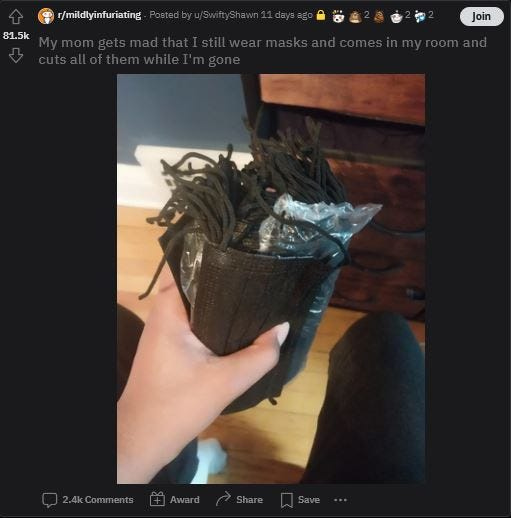More Than Half of Gen Z Are Struggling with Mental Health, and It's Not Their Phones
Let’s say you’re still trying to mask up during what many of us consider an ongoing pandemic, or maybe you’re just wearing one to protect yourself from all the volatile compounds in the wildfire smoke you’re being forced to breathe. Instead of supporting you, your mom sneaks into your room while you’re out and cuts up your masks.
Yes, that actually happened.
Take a look at Reddit:
Tell me how you’d feel if someone you were supposed to be able to trust constantly sabotaged your physical health while destroying your property. Tell me how you’d feel if you were also expected to work 8 hours of overtime for free every week and your rent went up 50 percent faster than your income. Tell me how you’d feel if media outlets finally admitted that you were never going to own a home, the world was running out of antibiotics, nobody really had a plan to make things better, and you were stuck living like this for the foreseeable future.
Now tell me how you’d feel if this is the advice you got:
Think positive.
Eat at regular times.
Take little naps.
Listen to music.
Exercise more.
Hum.
Declutter your apartment.
Socialize more.
Maybe you’d feel insulted, even gaslit. Maybe you’d feel depressed, and anxious about your future. Maybe you’d feel like nobody on this planet actually gave the tiniest little bit about you. Maybe you’d feel like nobody was actually in charge. Maybe you’d feel like anyone who even pretended to be in control had become so divorced from reality, so hostile toward your very existence, it didn’t matter what you did anymore. Maybe you could put those feelings aside long enough to get through the day, but they were always waiting for you every time you closed your eyes.
Maybe you see where I’m going:
Gen Z isn’t doing so well.
More than 90 percent of people between the ages of 15 and 21 are reporting significant stress in their lives. More than 50 percent of people under 30 are taking medication to deal with their deteriorating mental health. When the media talks about it, they blame social media or pandemic lockdowns, but those aren’t the reasons. They’re excuses.
They’re distractions.
When you look at the surveys, and when you actually talk to young people, you learn something important.
The pandemic didn’t cause their stress.
Neither did their phones.
They simply woke up.
They woke up to America’s glaring problems with poverty, inequality, violence, and climate collapse. They woke up to the fact that many of their leaders and even their immediate supervisors consider them expendable. After all, young people were the first to get laid off three years ago. They’re now expected to do the lowest paying, most dangerous jobs as states roll back child labor laws, encouraging them to work at factories and meat packing plants. Sixteen-year-olds can even serve alcohol now. Politicians claim it’s somehow going to help them, but it’s really about continuing the cycle of wage exploitation.
Young people have largely given up on the American dream, but they’re stuck living with its ghost.
For example, a growing number of zoomers and millennials see tiny homes as the best or maybe the only sustainable option for their housing needs. And yet, most states and counties make it incredibly difficult to own one. Some counties even pass zoning restrictions saying you can’t build a house smaller than 1600 square feet.
Young people are trying to make a living, but politicians get in their way. Maybe you’ve heard that Montana completely banned TikTok earlier this year. They forgot that thousands of their own residents use that app to run viable businesses and earn money.
Now that’s all up in the air.
Maybe you see now. Even when young people try to make a better life for themselves, the ridiculous laws and limited mindsets of older generations hamper them at almost every turn.
They aren’t being allowed to make the future they want.
This problem extends all the way up and down the age spectrum. Gen Z is feeling it the worst, but so is every other generation. There’s millennials and baby boomers who want to live in tiny homes. There’s members of Gen X who want to abandon the traditional workweek. If nothing else, we want a public space where we can talk openly about the world’s problems without having to sugarcoat it with optimism.
We can’t even get that half the time.
A Yale study found that 70 percent of Americans are worried about climate change. More than 30 percent of them are deeply worried. Only 8 percent are talking about it on a regular basis.
You can see why.
Anytime people try to speak up, they’re shamed. They get the advice I cited earlier. They’re told to think positive and exercise more. They’re told to bury their true thoughts and feelings under fake smiles and platitudes. Their leaders ban their apps, or set limits on how many tweets they can read a day. They say it’s for our own good.
They claim they’re “protecting” us.
It’s infuriating.
There’s more than a little irony here. The ones who claim to care about our mental health are using it to silence us.
It’s making the problems worse.
The media often drives generational divides, pitting us against each other when we all seem to want the same thing. They run sensational stories about the youngest generation’s entitlement to get everyone else riled up. They do it all the time. It feeds a constant cycle of infighting and resentment that stifles real change. Of course, the media didn’t create these tensions out of thin air. They exist.
They’re easy to play.
In reality, I do get angry at my parents and my in-laws. They aren’t sneaking into my house to cut up my masks, but they still display an astonishing level of condescension on a range of topics. Some of my relatives joke about throwing trash on the road. They think a mortgage costs $500 a month. They think I have a pension.
They complain about the messy grad students who rent their apartments. They ask servers to sing for them at restaurants. They say poor people spend too much time on their phones.
They express their “concern” for us because we’re still taking Covid precautions when most people aren’t.
I can’t even get my dad to recycle.
Sometimes I really do want to scream at them. And yet, I have to remind myself that they don’t represent their entire generation. There’s people my age who show the same infuriating naivety.
They’re just not as financially well off.
I’m not taking any medication for my mental health. I’m not suffering from depression or anxiety. What I have is a deep, smoldering anger at the planet we’ve been left with. Every day, I have to spend time managing that anger so it doesn’t consume me.
It’s not easy.
I think if you really sat down and spoke to young people, that’s what they’re feeling. It’s not just anxiety or depression. It’s a deep sense of betrayal, something more akin to moral outrage. Imagine being told for ten years to hustle your way to riches, and then all of your politicians started talking about banning the world’s most popular social media app, while the world’s richest man slowly destroyed the second most popular one in some misguided quest to protect your free speech.
Would you be happy?
This is how life goes for a lot of us. You build something nice. Someone comes along and blows it up. You’re told to pick yourself up by your bootstraps and start over.
You keep doing it.
Every day, I think most of us feel like that Reddit poster. We’re trying to make the best of a bad situation. We’re trying to do what’s right for us and each other, but we can’t. The parents keep sneaking into our room and cutting up our masks. They’re not helping.
Some of them aren’t even trying. At every single opportunity, they’re making life harder and then blaming us.
And they wonder why we’re sad?
Gimme a break.




